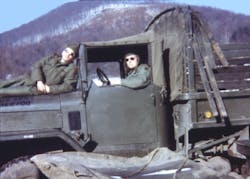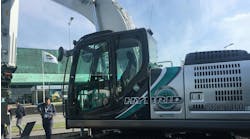It seems like a lifetime ago, but after joining the US Army in February of 1972, I found myself stationed in Aschaffenburg, Germany, in early July, 1972. I still remember getting picked up at the the railroad station by a guy named Denmark, who hailed from northern Florida, with an accent to match — and could he play the guitar!
Denmark loaded all my belongings, all in a duffle bag, into his jeep, and after a short drive, we arrived at Fiori Kasserne, a US Army base that I later learned had been built as a German Army training camp for World War I.
I didn't get settled in right away because the radar machines I had been trained to repair had been obsolete for years, so I never saw one in the field. I wasn't trained to operate the machines, so I couldn't be of much use in the platoon that operated the newer machines.
Fortunately, I got transferred to the maintenance platoon. That was better, and I met a guy in my platoon — William Mace Martin, from Logansport, Indiana — who took me under his wing. Bill and I had a lot in common, even though he was married and had an apartment off base. Bill and I became good friends and hung out together a lot — sometimes the two of us, sometimes with his wife.
My formal Army training didn't really qualify me to do anything, and Bill said it would be a good idea to get a military driver's license. Of course, I knew how to drive, but Bill taught me how to drive a monstrous 2½-ton truck — or, deuce and a half, in Army lingo. It had 10 speeds, rear-wheel or all-wheel drive, air brakes, and other macho features. Nonetheless, Bill had me driving around the base in no time. And more importantly, he taught me how to back up a trailer — which is still useful today whenever I have to back my camper into a tight spot. He often taught me on his own time, on Saturdays. So, yeah, Bill was a great guy and a good friend.
Bill and his wife didn't like their situation in Germany, so after several months, he was able to get a transfer back to the states. I was genuinely happy for them, but just before his scheduled departure, Bill approached me on pay day. He said the Army wasn't covering all his moving expenses, and he really needed some cash. He asked to borrow $100, what amounted to most of my bi-monthly take-home paycheck. I was reluctant, but he promised me he'd be good for the money, and that I knew the kind of person he was and that he'd certainly pay me back once he got settled. I gave him the money, but I never heard from again.
I was probably bitter by getting burned by my friend at first, but it never really ate away at me. I'd sometimes wonder how much the money would be worth — with interest — in today's dollars. I even tried looking him up a few times, but to no avail. Besides, maybe something serious happened that prevented him from sending me the money, or maybe he just lost my contact info. So, no, I didn't become bitter, but I couldn't forget, either.
Then I came to a realization that what Bill did for me was far more valuable than the money he never repaid. When our battalion went on field maneuvers, truck drivers, like me, got to sit in a heated cab on a padded seat, rather than on a wooden bench in the back of a cold, windy truck — which even many sergeants had to do. I drove for the mess hall, so instead of crawling around in the mud and snow, I drove the cooks and food around all day so my comrades could be fed in the field. And back at the base, I drove for the supply sergeant, and at least once a week we'd head up to division headquarters for an enjoyable day replenishing supplies.
So, Bill, if you're still out there, your debt is forgiven. In fact, I'd love to get back together to find out what happened to you and share some interesting stories I enjoyed driving that big ol' deuce-and-a-half all over Bavaria!

Continue Reading
Continue Reading
Motor leakage variations
Oct. 18, 2006
Sponsored Recommendations
Sponsored Recommendations
How Variable Volume Pumps Work
Feb. 6, 2024
What is a Check Valve and How Does it Work?
Feb. 6, 2024


